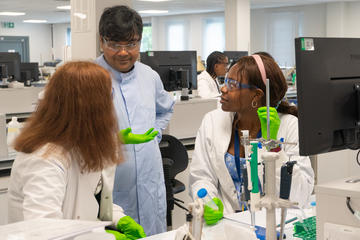Foundation Year in Chemistry, Engineering and Materials Science (CEMS)
Foundation Year in Chemistry, Engineering and Materials Science
Are you a student from the UK interested in studying Chemistry, Engineering Science or Materials Science but your personal or educational circumstances have meant you are unlikely to achieve the grades typically required for Oxford courses? If so, choosing to apply for your course with a Foundation Year might be the right option for you.
Whichever pathway you choose, students also take the Preparation for Undergraduate Studies course.
Student stories
Meet Riyad, a former Foundation Year with Materials Science student. Discover how the Astrophoria Foundation Year helped Riyad take his first steps into university life and thrive at St Anne’s College. Watch his story to hear what it’s really like to study at Oxford through the Foundation Year.
https://www.youtube.com/embed/-Croe-yk2Rg?si=fQyDHe-Y3hJSLH2q
Subject pathways
Chemistry
Chemistry with Foundation Year
Subject requirements: Maths and Chemistry at A-level (or equivalent)
- UCAS code: F10F
- Open the Chemistry with Foundation Year UCAS page
Engineering Science options
Whichever subject pathway you choose, all Engineering Science with Foundation Year students follow the same course structure and study the same course content. This continues in the first two years of the undergraduate degree. The subject requirements for all Engineering pathways are the same: Maths and Physics A-level or equivalent
Biomedical Engineering with Foundation Year
Chemical Engineering with Foundation Year
-
UCAS code: H80F
-
Open the Chemical Engineering with Foundation Year page on UCAS
Civil Engineering with Foundation Year
-
UCAS code: H20F
-
Open the Civil Engineering with Foundation Year page on UCAS
Electrical Engineering with Foundation Year
Engineering with Foundation Year
-
UCAS code: H10F
Information Engineering with Foundation Year
Mechanical Engineering with Foundation Year
Materials Science
Materials Science with Foundation Year
Subject requirements: Maths and Physics A-level (or equivalent)
-
UCAS code: FJ2F
-
Open the Materials Science with Foundation Year page on UCAS
People
Sam Li Shen, Engineering Subject Lead
Chiheb Ben Mahmoud, Materials Science Subject Lead
What will my week look like on the Foundation Year in CEMS?
You will:
- attend around 8-12 hours of lectures, classes and tutorials each week, including Oxford-style tutorials where you will discuss your work in small groups with your tutors.
- work independently on your studies,
- participate in regular laboratory work, including MATLAB coding for Engineers and (optionally) for Materials Scientists.
In your final term you will also complete a mini-project on a subject-related topic of your choice, deepening your subject interest and building your skills in independent study.
Find out more about the Foundation Year in Chemistry, Engineering and Materials course structure.
Entry Requirements
Subject requirements depend on the undergraduate degree course you wish to study:
- For Chemistry with Foundation Year, students are expected to have Chemistry and Mathematics to A-level (or any other accepted equivalent qualification). An additional science subject or further mathematics are also recommended.
- For all Engineering with Foundation Year courses, students are expected to have Physics and Mathematics to A-level (or any other accepted equivalent qualification).
- For Materials Science with Foundation Year, students are expected to have Physics and Mathematics to A-level (or any other accepted equivalent qualification). GCSE-level Chemistry is also required and Chemistry at A level is highly recommended.
The typical A-level entry requirements are AAB, with an A in the relevant subject:
- For Chemistry with Foundation Year, an A in Chemistry is required
- For all Engineering with Foundation Year courses, an A in Physics is required
- For Materials Science, an A in either Physics or Maths or Chemistry is required
We do accept other types of qualifications. More information about the academic entry requirements and accepted qualifications is available on the Foundation Year in Chemistry, Engineering and Materials Science course page on the University of Oxford website.
Do you have a question about studying Chemistry, Engineering or Materials Science as part of the Astrophoria Foundation Year?
You can ask your questions about the Foundation Year in Chemistry, Engineering and Materials Science here. We'll answer questions regularly and as soon as we can until the application deadline in January 2026.
More about Chemistry, Engineering and Materials Science at Oxford University

Oxford's facilities for studying and exploring science are amongst the best equipped and most advanced in the UK. Students can take advantage of the enormous range of laboratories and research equipment available. The University of Oxford has invested over £400 million over the past ten years into its science facilities and infrastructure.
Oxford is home to the History of Science Museum and the Museum of Natural History.
Oxford's alumni include many famous scientists and engineers. See a list of some of the most famous Oxonians.
There are also a number of student science societies you can join including: Chemistry and Biochemistry Society; Bioengineering Society; Biochemical Society; Biotechnology Society; Engineers Without Borders; Materials Society; Physics Society; Technology and Innovation Association; Women in Engineering, Science and Technology.
Oxplore: The Home of Big Questions

Go beyond what is covered in the classroom with Oxplore. Look at big questions that tackle complex ideas across a wide range of subjects, and engage in the kind of critical thinking students undertake at university.
Are explosions always destructive? Could time travel ever be possible? Are humans ruining the earth?






